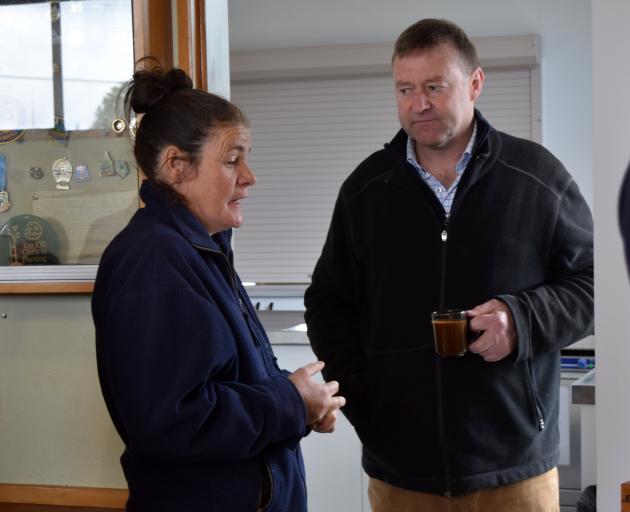
The cleanup continues in wind-ravaged Clutha and Southland.
Severe winds toppled trees, flipped vehicles and brought down power, telecommunications and water networks, closed roads and caused widespread damage to rural properties across the South on October 23.
A State of Emergency was declared in Southland and Clutha and the government gave the event a medium-scale classification.
About 80 people packed out a meeting at Ōwaka Community Centre last week.
A series of meetings were organised in Clutha by the Ministry for Primary Industries and Otago Rural Support Trust, aimed at assisting communities in the aftermath of the storm.

The biggest concern was how farmers were dealing with fallen trees, which could be dangerous to remove.
"We don’t want any injuries or fatalities."
Mike Hurring Logging owner Mike Hurring, of Balclutha, said he had worked in the forestry industry for a long time and it was the worst storm event he had encountered.
Trees were continuing to fall down, he said.
"They can fall over at anytime. Don’t think because they are still up, they are safe."

"There are too many dead heroes out there."
If a tree was under tension, a chainsaw scratching the bark could send a log flying.
"They go off like a bullet."
Since the storm, chainsaw sales had been booming, he said.
"Every man and his dog is going to be out there on a chainsaw."

"Don’t think because it is looks small, it is easy."
Any chainsaw operator must wear personal protective equipment such as chaps, gloves, a hard hat and hi-vis.
"A chainsaw will kill you if it is not treated in the right manner and with respect."
A chainsaw needs to be maintained and the operator should wear a safety mitt to decrease the chance of a kickback.
"A chainsaw once got ripped out of my hands and went over my head, I’ve been lucky to get away with it."

If dairy sheds had plugs to connect a generator, installation was easier.
People had been doing their own electrical repairs since the storm hit.
"We have heard of people wiring up their own places, maybe not in the best of ways."
The work should be checked by an electrician because it could pose a "huge risk" to people working on an electricity network.
All electrical infrastructure should be treated as live, he said.

"Try to recognise if you are overwhelmed and seek support. You are not alone."
The top priority of a farmer was to look after themselves.
"Make sure you stop and take a breath. This cleanup is not going to happen overnight."
People made mistakes when they were tired, he said
"Make sure you eat well and you sleep well."

Clutha District Council Civil Defence recovery manager Sharon Jenkinson said emergency-access funding was available from a Mayoral Relief Fund and could be used to pay for insurance excesses.
People could apply on the Clutha District Council website.
Retired farmer Barrie Leslie, of Owaka, asked why Civil Defence did not send a text message alert that a storm was travelling across the South and causing widespread damage.
A series of test alerts had been sent when there was no emergency unfolding.
"That’s fair enough, but how come this time there is silence? What is the difference? This time there was an actual event."

At the meeting a farmer asked Otago Regional Council compliance team leader Mike Cummings, of Dunedin, if he could remove fallen trees from a ditch without breaching any council rules.
Mr Cummings said if anyone was unsure whether any activity was permitted, they should contact ORC and staff would provide advice.
"As a regulatory organisation we can’t give you permission to break the rules."
During a natural disaster the rules still applied, Mr Cummings said.
"If you can’t meet the rules or regulations, let us know."

Mr Napier said nearly 100 large trees had fallen on his farm.
"Entire hedgerows have fallen over — it is just a bloody mess. All the forestry blocks up the valley look like a war zone."
The older, more rigid trees were hit the hardest by the storm, he said.
"The ones getting up to 100-year-old just wore it."
Trees had fallen in waterways and the ORC should support farmers to remove them as quickly as possible to stop slash floating down stream and destroying infrastructure, such as bridges.

He expected the cleanup could take two or three years, as the work required would be challenging to execute.
The wind had destroyed a shed or barn on the properties of all of his neighbours, he said.
Power was down on his farm and he did not expect it to return for weeks.
He had a generator to power his home but his electric fences, which contained livestock, remained down.
A lack of electricity was impacting the daily operation of the farm, such as being able to use his welder to make repairs.

"All of the fences are gone and the gates are crushed."
They were handling the situation as best they could, Mr Napier said.
"You’ve just got to carry on, don’t ya?"
More needed to be done to ensure trees were planted nowhere near powerlines, he said.
Mrs Napier agreed.
If a powerline was serving a community, no tree should be allowed to stand near it, to avoid falling trees impacting powerlines.

Minister for Rural Communities Mark Patterson, of Lawrence, called the storm the biggest wind-related event in the living memory of the South.
"There is going to be a really long tail to this."
Nobody being hurt in the storm was a "miracle", he said.
The community response had been "absolutely extraordinary".
"You’ve really shone."














